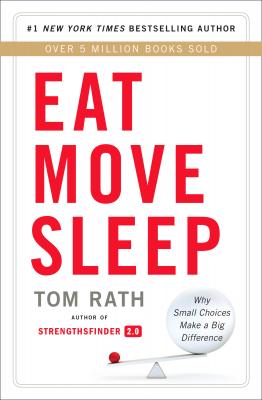Eat Move Sleep. Tom Rath
Читать онлайн.| Название | Eat Move Sleep |
|---|---|
| Автор произведения | Tom Rath |
| Жанр | Личностный рост |
| Серия | |
| Издательство | Личностный рост |
| Год выпуска | 0 |
| isbn | 9781939714015 |
The First Order Anchors the Table
The more people you dine with, the more food you are likely to eat. When dining with one person, people eat 35 percent more than when they are alone. Sharing a meal with more than four people increases consumption by 75 percent. When people eat in groups of seven or more, they eat 96 percent more than when they dine alone. When you dine with friends, social expectations shape your decisions more than you realize.
“Anchoring” is a term behavioral scientists use to describe how people rely too heavily on the first piece of information they hear. If someone offers you a product for $100, you will think it is a deal to purchase that product for $75. With almost any purchase, small or large, the sticker price serves as an anchor for all discounts and negotiations.
The same phenomenon occurs when you dine out with friends. The first person to announce what he or she is ordering sets an anchor for the entire group. If the first person ordering chooses a healthy option, it puts a little pressure on everyone else at the table to do the same.
The next time you are dining out with a group, see if you can detect how your choices influence others. If you are planning to order a healthier item, share that choice with friends while you are looking at the menu. Or be the first one to order and anchor others’ decisions toward better choices
When the wheels of a car are not aligned properly, it pulls toward one side instead of moving straight ahead. Over time, this poor alignment creates uneven wear on the car’s tires. A similar problem occurs when your body’s motions are not aligned and balanced. Using one side of your body far more than the other, for example, can create uneven wear and serious back problems over time.
If you need to carry a purse or bag for more than a block, switch the side you carry it on frequently, or use a backpack to distribute the load evenly. I have noticed it helps when I alternate sides when I carry my kids. Even when I walk home from the grocery store, I now carry two lighter bags instead of one heavy bag in my dominant hand.
When you use a computer, check the basic alignment of your keyboard, screen, and chair. Then mix it up to minimize repetitive motion. If you have used your right hand to operate your mouse for years, try using your left hand.
I went as far as to put trackpads on the left and right side of my computer to force myself to use both arms interchangeably. Doing this for a few years eliminated my chronic wrist and back pain. Another option is to alternate between a trackpad, trackball, touchscreen, or other input device instead of solely relying on a mouse using your dominant hand.
Apply the same principle to your phone. Switch the hand you use or the ear you speak into regularly. Do whatever you can to create variance and keep both sides of your body in balance.
Keep artificial light before bedtime from ruining your sleep. Exposure to light in the hours before you go to sleep suppresses melatonin levels. Lower melatonin levels make it hard to fall asleep, decrease sleep quality, and could even increase the risk of high blood pressure and diabetes.
Melatonin plays a critical role in regulating our sleeping and waking cycles. To study fluctuations in melatonin levels, one team of researchers followed 116 healthy volunteers for five consecutive days. The researchers inserted an intravenous catheter into each person’s forearm. This allowed them to measure melatonin levels continuously. They discovered that exposure to bright light before bedtime decreased the beneficial effect of melatonin by 90 minutes compared with dim light exposure.
One implication from this emerging research is to consider your use of indoor lighting. Open the blinds and keep lighting bright during the day. Use “cool white” light bulbs near 6500K in color temperature, which are designed to mimic natural daylight, in areas where you work. These bulbs emit additional light from the blue part of the spectrum versus the yellowish light from traditional incandescent bulbs. This blue-toned electrical light and natural sunlight slow melatonin production and help you be more alert.
Use “warm” or more yellow-colored lighting closer to 3000K in color temperature in your bedroom or other areas where you spend your time in the evening. Then turn all artificial lighting down during evening hours. Avoiding bright and blue-toned light in the evening allows your body to produce extra melatonin and helps you sleep. Relying on natural light or simply dimming your lights late in the day (dimmers are relatively inexpensive and save electricity) will also improve your sleep quality.
Then eliminate as much light as you can in your bedroom. If you read in bed each night, use a small reading light instead of brighter overhead lighting. Add room-darkening curtains, cover any artificial light from clocks or electronic devices, and remove any other distractions.
Research has shown how consumption of specific protein sources can provide the nutrients you need, without the negative effects of hot dogs, hamburgers, or pastrami sandwiches. While it may be okay to eat meat occasionally, you can get all the protein you need from plant-based sources.
Getting more protein from fruits, vegetables, nuts, and fish will also increase your intake of omega-3s, which are deficient in most people’s diets today. Omega-3s are essential
